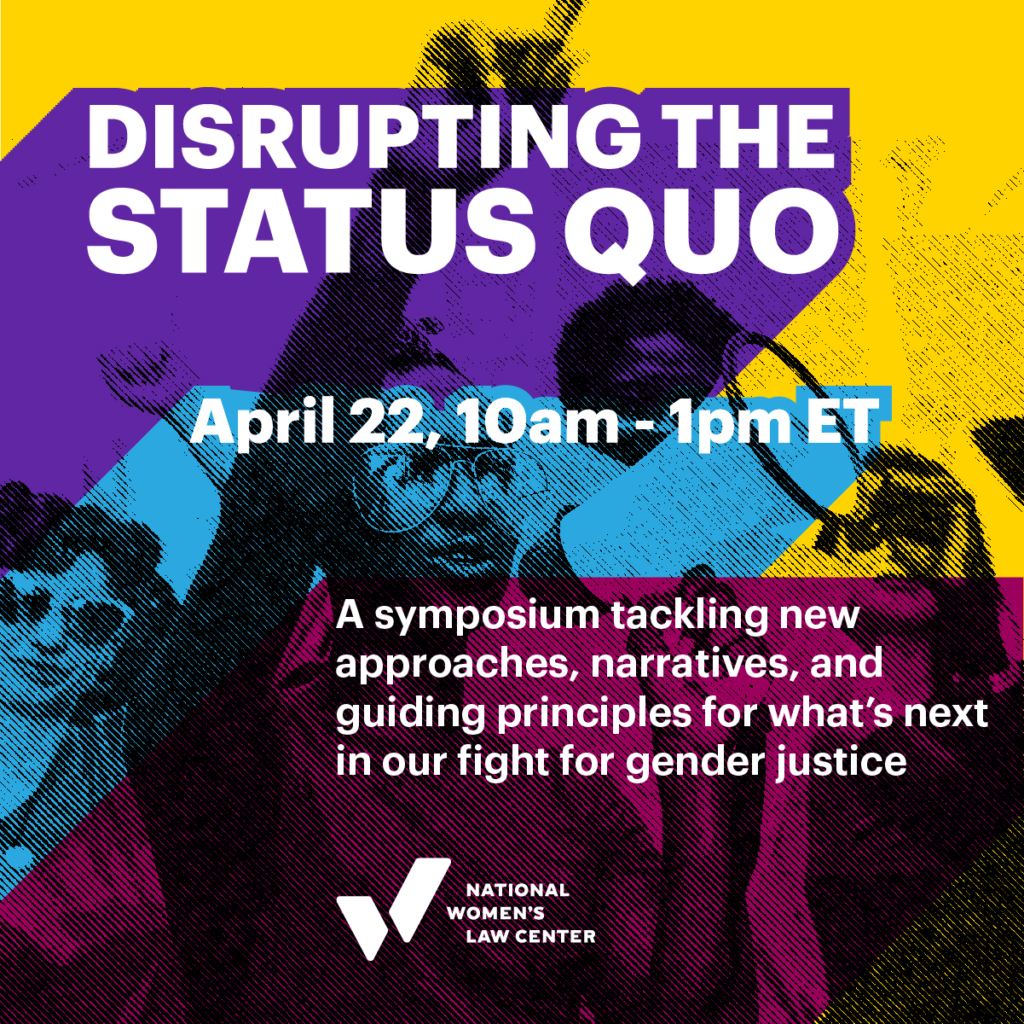We hope you enjoyed the symposium. Event videos are linked below. Click on the panel title to access the recording.
Join the National Women’s Law Center, our partners, and other thought leaders on April 22 from 10am-1pm ET for a virtual symposium tackling new approaches, narratives, and guiding principles for what’s next in our fight for gender justice. For too long, issues pertaining to gender justice have been tokenized and packaged in politically convenient ways. But now, against the backdrop of a global pandemic compounded by generations of systemic racism and sexism, and where progress for women has been reversed by decades, we must no longer do business as usual. The only way forward to a future that is prosperous for our whole nation, is by disrupting the status quo. This multi-panel symposium will feature our own policy experts in conversation with other leaders in the gender justice movement.
Watch the full program here!

Panel Descriptions and Program
Fireside Chat (10:00-10:30 am)
Fatima Goss Graves (President and CEO, National Women’s Law Center) and Brittany Packnett Cunningham (Activist, BET VP of Social Impact, and Host of UNDISTRACTED Podcast)
Moderator: Arvia Walker (Director of Campaigns, National Women’s Law Center)
Panelists: Sevonna Brown (Co-Executive Director, Black Women’s Blueprint), Araceli Gonzalez (Fuerza Pride New Jersey), Jennifer McClellan (Jennifer McClellan, Virginia State Senator, 9th District)
- How are women of color and trans people who experience harassment silenced and carved out of the laws, systems, and movements meant to address harassment and sexual violence and how can we work to change that?
- While the #MeToo movement has increased public awareness of sexual harassment in our schools, our workplaces, and in healthcare, sexual harassment still remains pervasive and legal protections against it are insufficient, especially for women of color and trans people. In this panel, experts will share how women of color and trans people are disproportionately impacted by sexual harassment is in schools, workplaces, and in healthcare and how our current legal protections erase or minimize their experiences and often leave them unprotected.
- Panelists will also discuss the rising backlash towards addressing sexual harassment and protecting survivors, and what legal protections we can fight for to effectively prevent and respond to sexual harassment, especially for women of color and trans people.
Redefining Family Values: Systemic Reforms Needed to Support Care and Pregnancy (11:00-11:30 am)
Moderator: Emily Martin (Emily Martin, Vice President for Education and Workplace Justice, National Women’s Law Center)
Panelists: Georgia Goldburn (Georgia Goldburn, Director, Hope For New Haven), Tina Sherman (Senior Campaign Director, Maternal Justice, MomsRising)
- Over generations, antiquated family value systems in our country have devalued care, perpetuated discriminatory practices, and placed a disproportionate amount of harm on women, and in particular women of color.
- In this panel, we will examine the structures, attitudes, and ideals that must shift to end pregnancy discrimination revolutionize our care system, and put women of color at the center of the solutions.
Moderator: Dorianne Mason (Dorianne Mason, Director of Health Equity, Reproductive Rights and Health, National Women’s Law Center)
Panelists: Kwajelyn Jackson (Kwajelyn Jackson, Executive Director, Feminist Women’s Health Center)
- Many factors beyond coverage and care impact individual and community health.
- Destabilized housing, collapsed childcare infrastructure, job loss, racial reckoning, and loss of loved ones can add both literal barriers to care and also significant overall stress. Barriers and stress impact both individual and community health.
- The physical and mental health consequences of COVID-19 and its barriers and stress will extend well beyond the immediate aftermath of the pandemic.
- Panelists will share:
- How lost health coverage, missed work, unstable housing, financial stress, no break from caregiving responsibilities and grief impact health
- How these effects are especially acute for women of color
- What future mental and physical health consequences we can expect
- Post-COVID landscape, including new barriers to care and new opportunities
- How state and federal legislators can respond to address the current and impending health crisis
Recovering from the Shecession (12:00-12:30 pm)
Moderator: Melissa Boteach (Vice President for Income Security and Child Care/Early Learning, National Women’s Law Center)
Panelists: Amy Hanauer (Executive Director, Institute on Taxation and Economic Policy), C. Nicole Mason, PhD (President and CEO, Institute for Women’s Policy Research), Cassandra Welchlin (Executive Director and Lead Organizer/Co-Convener, Mississippi Black Women’s Roundtable)
- This pandemic and related recession hit women, and particularly women of color, especially hard.
- The American Rescue Plan Act addresses the near-term impacts of the pandemic. Moving forward, policymakers should consider the Rescue Plan as the foundation for an equitable economic recovery that centers women, communities of color, and families with low incomes.
- We cannot accept the pre-COVID status quo as the benchmark. Structural changes and significant public investments in housing, the care economy, a more progressive and equitable tax code, and increased wages, are the only way forward to sustainable and broadly shared prosperity.
- How can we raise revenues to invest in our shared priorities?
- We need robust public investments in the supports women need to succeed in this economy. What are the key solutions to bridge relief and recovery to build back better?:
- Investing in care economy
- Housing
- More equitable tax policies
- Worker protections/raising the minimum wage
Closing Conversation (12:30-1:00 pm)
Fatima Goss Graves (President and CEO, National Women’s Law Center) and Catherine Lhamon (Deputy Director of the Domestic Policy Council for Racial Justice and Equity, The White House)
